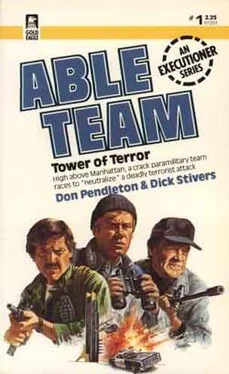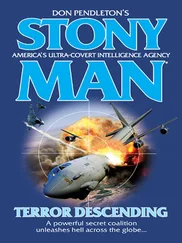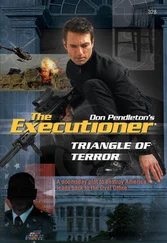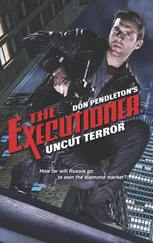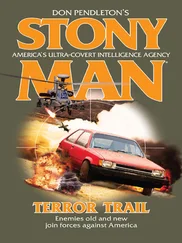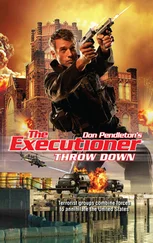"And that's the information?" Lyons asked.
"Why did you want to tell us about this?" Blancanales sighed. "Why not the people in Washington, D.C.?"
"We did. I told you they did not believe us. Also, they would not consider cooperation with our group."
"Thank you for the information," Blancanales sighed. "Now, explain what 'cooperation' you want from us."
"It is simply this. The individual and his group have deceived and embarrassed our government. They could seriously impair our nation's future relations with your nation. We assume you will eventually capture these...terrorists. You will?"
"Pretty quick," Lyons told her.
"We want them exterminated. No investigation. No trials. No public revelations. Could that be arranged?"
The three members of the Able Team glanced at one another. Lyons frowned. "Do you have more information on the individual who approached your government? And the other terrorists?" he asked.
"Photographs, notes," she replied.
"Show us."
"The information is not in the automobile. We have a rented apartment in this city. Would you take me there? I could give..."
"We'll discuss this," Blancanales interrupted. He glanced at Lyons and Gadgets. "Conference time."
They went to a far corner of the garage. Blancanales covered the young woman where she sat against the car.
"What do you two think?" Lyons asked them. "You both know Vietnamese people better than I do."
"That woman is one of the smartest people I ever ran up against," Gadgets told them. "And I know, I know , it isn't the way she says."
"It's lies inside of lies," Blancanales concurred. "But you'd better believe they want those people dead. Exterminated."
"We need the information she's talking about," Lyons told them. "I want the photos. I want the notes. Even when we do get the psychos inside the Tower, that won't mean we've got their leaders ."
"Right," Blancanales said. "I've got a folder full of punks and crazies, but none among them is the mastermind."
Inside the satchel slung over Gadgets' shoulder, a hand-radio buzzed. "Hardman Three here," he responded.
"Mr. Taxi relaying a message." All of them could hear the voice coming from the hand-radio. "There's a man named Brognola screaming for you all. He says to get back to the Tower, right now . I mean, he is pissed. Over."
Lyons keyed the hand-radio. "Tell him we're coming back real quick. Tell him there's been significant progress."
"Things must be critical over there," Gadgets said. "But so is this."
"Okay, you two go back," Lyons offered. "I'll go with her."
"I can send back my info with Gadgets," Blancanales countered. "You'll need backup if you're going to find out what she's talking about."
"You two be careful now," Gadgets warned. "That chick is dangerous."
Lyons checked his watch. Thirty-six hours remaining. "Five o'clock, gentlemen. Time sure flies when you're having fun."
On the fifty-third floor of the World Financial Corporation Tower, in the offices of Eastern European Accounts, the afternoon went very slowly. Charlie Green, as reluctant commander of his office staff, prepared the women to defend themselves if the terrorists came to their floor.
First, he went to the custodian's closet and kicked down the door. He found a few tools, a set of master keys for the floor, and coveralls. He stripped off his running clothes and slipped on the coveralls. If the terrorists got him, he didn't want them to think he was an executive. The coveralls also gave him pockets for the .45 automatic and the tools and keys.
Opening an office near the elevators, he posted Diane as sentry. She seemed to be the coolest of the three young women. He placed her so that she had maximum concealment and safety. "Sit in here, keep the door open only two or three inches, and watch those elevators. If anybody, I mean, anybody — crazies, police, phone company, security guards — comes out on this floor, you let out a scream, then close this door. They'll have to break it down. That'll warn us. I'll be back in a few minutes to work out an escape plan for you."
"You mean they get me so that you others can get away?" Diane asked sarcastically. "I think you ought to get another volunteer."
"Only for awhile," he assured her. "Then we'll have a better plan in operation."
Green returned to the other women. As the director of the department, Green had the largest office on this floor. There was a large work area for clerks and computer workers, a reception area with Mrs. Forde's desk, then his private office.
"Jill," he told the terrified young woman in thick glasses, "go to the janitor's room. The door's open. There's a dolly for moving furniture in there. Bring it here. Sandy, go to my office and tear down the drapes. Separate the nylon cord from the hardware, coil it up." Green waited until the young women left the office.
"Now, Mrs. Forde," he said, turning to her last. "We plan an ambush."
For the next half hour, they moved filing cabinets, shifted furniture, improvised booby-traps. Green briefed each woman on her role. "It's not necessary for us to kill them all. We don't have to kill any of them. We'll just give them a surprise, and that'll slow them down while we retreat. These three offices will be surprise number one. Then we go up into the ceiling and into the other offices. And the more time they give us before they come searching this floor, the more surprises we'll have ready for them..."
Leaving Mrs. Forde in charge of the "surprise," Green roamed through the other offices of the fifty-third floor. He ripped down drapes, pasted sheets of computer printout against the plate glass. He wanted the police to know people were trapped on the floor.
Perhaps rescue was possible. But he doubted they could be rescued before the police recaptured the Tower.
In fact, it was with some relief that he doubted the value of any preparations to avoid the terrorists. The Tower had a hundred floors, a thousand offices, many thousands of rooms and cubicles. If the terrorists had hostages to guard, police to watch, demands to negotiate, they wouldn't have time to search the Tower. There would have to be a hundred terrorists.
The preparations were busy-work, for the women and for him. Panic was their greatest enemy. If he gave the women plans to remember and positions to hold, they would have less time to be afraid.
He knew from his tours in Vietnam that waiting created fear. When trouble came, it came fast. It was life or death. But in the hours or days or months of waiting, the imagination created terrors. He'd had some bad times over there, but some of the worst times were the nights without action, without contact, when there was only darkness and fear and imagination.
Finding a transistor radio in one of the offices, he started back to the women. He paused to test Diane. Part of the "surprise" was her new position as sentry. She sat in the corridor where she could watch all the elevators. If anyone were to come onto the floor, either from the elevators or from the emergency stairs at each end of the corridor, she was to run into the office, set the plan in action.
She saw him, started, but recognized him before she gave a false alarm. "You trying to scare me?" she asked, giggling nervously.
"Take a break," he told her. "Switch with Jill or Sandy. Time to listen to the news."
Back in his office, Green scanned the rooftops of the nearby buildings. Almost invisible in the shadows of a building's air-conditioning stacks, a black-clad sniper waited. "That's the police," said Green with assurance.
Switching on the radio, he spun the dial. But they heard no reports of terrorists on Wall Street, or of shots fired at executives, or of a hostage drama in the financial district.
Читать дальше
